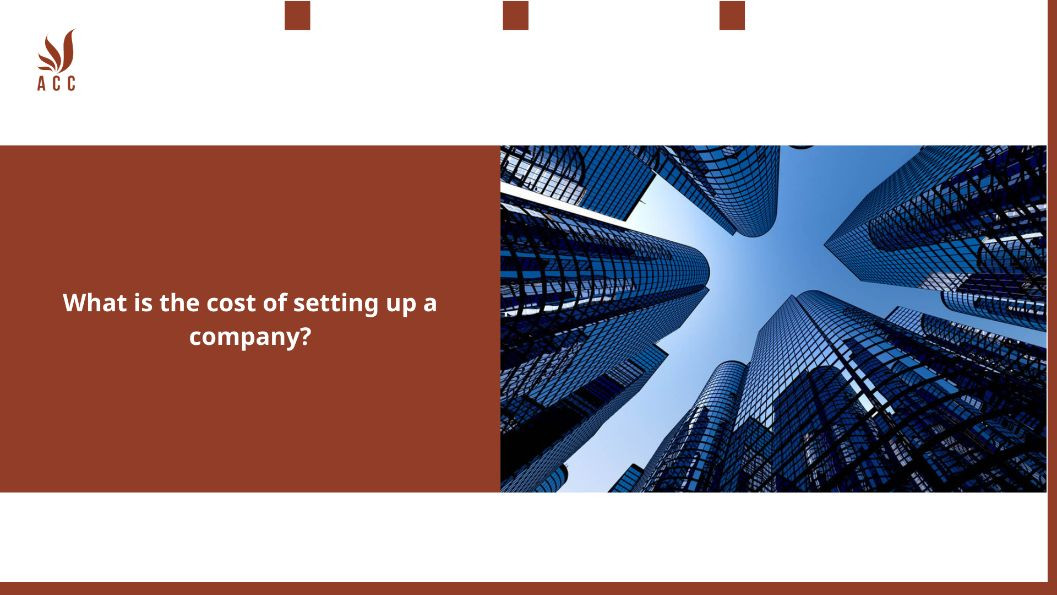The cost of setting up a company can vary depending on various factors such as the type of company, location, industry, and specific requirements. Here are some common costs to consider when setting up a company:
1. Business registration fees:
This includes the cost of registering your company with the appropriate government authority, such as Companies House in the UK or the Secretary of State in the US. The registration fees can range from a few dollars to a few hundred dollars, depending on the jurisdiction.

2. Legal and professional fees:
You may need to consult with professionals such as lawyers, accountants, or business consultants for legal advice, drafting contracts, or other services. The fees for these services can vary based on the complexity of your needs and the professionals' rates.
3. Office setup:
If you require a physical office space, the costs can include rent, security deposits, utilities, furniture, equipment, and office supplies. The expenses will depend on factors such as location, size, and the level of amenities required.
4. Technology and equipment:
This includes the cost of computers, software, telecommunications systems, and other necessary equipment for your business operations. The expenses can vary based on your specific requirements and the quality of the equipment you choose.
5. Marketing and branding:
You may need to invest in marketing activities to promote your company and establish your brand. This can include website development, graphic design, advertising, and marketing materials. The costs will depend on the extent of your marketing efforts and the channels you choose.
6. Licenses and permits:
Depending on your industry and location, you may need to obtain specific licenses or permits to operate legally. The costs can vary based on the type of license or permit required and the regulatory requirements.
7. Insurance:
It's important to consider business insurance to protect against potential risks and liabilities. The cost of insurance will depend on factors such as the type of coverage, the size of your company, and the industry you operate in.
8. Initial inventory or stock:
If your business involves selling products, you may need to invest in initial inventory or stock. The cost will depend on the type of products, quantity, and supplier costs.
9. Miscellaneous costs:
There may be additional expenses such as website domain registration, business cards, signage, initial marketing campaigns, and any other specific needs related to your industry or business model.
10. Q&a
Q1: What are the typical categories of costs involved in setting up a company?
A1: The typical categories of costs involved in setting up a company include:
- Legal and Registration Costs: Expenses for business registration, permits, licenses, and legal consultations.
- Office Setup Costs: Costs related to securing office space, leasing or purchasing equipment, and office supplies.
- Technology and Software Costs: Expenses for computers, software, and other technology tools necessary for business operations.
- Marketing and Branding Costs: Budget for creating a brand identity, website development, and initial marketing efforts.
Q2: How can I estimate the specific costs for setting up my company, considering factors like industry and location?
A2: Estimating specific costs for setting up your company involves several steps:
- Research industry-specific requirements and standards to identify typical startup expenses.
- Consider location-specific costs, such as office space rental rates and local permits.
- Develop a comprehensive business plan that outlines anticipated expenses based on your business model, target market, and growth projections.
- Seek quotes and estimates from suppliers, contractors, and service providers to refine your budget.
Q3: Are there any cost-saving strategies that entrepreneurs can employ to reduce the expenses of setting up a company?
A3: Yes, entrepreneurs can employ several cost-saving strategies, including:
- Bootstrapping: Minimizing external funding and relying on personal savings or revenue to cover initial costs.
- Remote Work: Utilizing remote work arrangements to reduce the need for physical office space.
- DIY Approach: Using online tools and resources to handle tasks like website development, marketing, and bookkeeping in-house.
- Networking: Building relationships with suppliers, mentors, or other businesses to negotiate discounts or cost-sharing opportunities.
- Lean Operations: Focusing on essential activities and postponing non-essential expenses until the business is more established.
Q4: Are there any hidden or unexpected costs that entrepreneurs should be aware of when setting up a company?
A4: Yes, entrepreneurs should be aware of potential hidden or unexpected costs, including:
- Compliance Costs: Expenses associated with unforeseen regulatory compliance or changes in legal requirements.
- Emergency Funds: Setting aside funds for unexpected emergencies, repairs, or operational disruptions.
- Scaling Costs: As the business grows, there may be unforeseen expenses related to hiring, expanding operations, or adapting to increased demand.
- Market Changes: Economic or market changes can impact costs, such as fluctuations in supply chain prices or changes in advertising costs.
- Technology Upgrades: Regularly updating and maintaining technology infrastructure and tools to stay competitive and secure.
Nội dung bài viết:






Bình luận